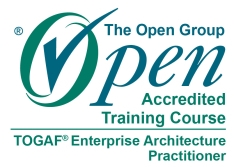We may not have the course you’re looking for. If you enquire or give us a call on 01344203999 and speak to our training experts, we may still be able to help with your training requirements.

close
Press esc to close

close


Press esc to close

close
Fill out your contact details below and our training experts will be in touch.



Back to Course Information
This ArchiMate® 3 Training Course thoroughly explains the basics of the ArchiMate® modelling language in order to comprehensively prepare delegates for the ArchiMate® 3 Part 1 and ArchiMate® 3 Part 2 exams. These topics include:
Module 1: Basic Concepts and Definitions
Module 2: Language Structure
Module 3: Generic Metamodel
Module 4: Modelling Relationships
Module 5: Modelling Motivation
Module 6: Modelling Strategy
Module 7: Business Layer
Module 8: Application Layer
Module 9: Technology Layer
Module 10: Modelling Physical Elements
Module 11: Relationships Between Core Layers
Module 12: Modelling Transformation
Module 13: Addressing Stakeholder Concerns with Architecture Views and Viewpoints
Module 14: Derivation of Relationship
Module 15: Motivation Viewpoint
Module 16: Strategy Viewpoints
Module 17: Basic Viewpoints – Business Layer and Application Layer
Module 18: Basic Viewpoints – Technology Layer
Module 19: Implementation and Migration Viewpoints
Module 20: Applying the Viewpoint Mechanism
Module 21: Language Customisation Mechanisms
ArchiMate® is a registered trademark of The Open Group.


This course is intended for individuals involved in Enterprise Architecture projects or those planning to initiate one, and who need to understand the Enterprise Architecture artefacts crafted using ArchiMate®. Professionals who can greatly benefit from it are -
There are no formal prerequisites for attending this ArchiMate® 3 Course.
ArchiMate® is a registered trademark of The Open Group.
ArchiMate® 3 Training Course, which is taught by expert trainers, is designed to provide delegates with a basic understanding of the ArchiMate® modelling language, including its notation, structure, terminology, and core concepts. With a focus on knowledge and comprehension, this course covers basics such as the passive subject elements, behavioural elements, and active subject elements at the heart of ArchiMate®, and the Business, Application, and Technology layers to which ArchiMate® can be applied.
ArchiMate® 3 Training Course will prove to employers that delegates understand the advanced concepts behind using ArchiMate® in practical scenarios, as well as its compatibility with Enterprise Architecture frameworks like TOGAF® and languages like Business Process Modelling Notation (BPMN) and Unified Modelling Language (UML). This certification also demonstrates initiative and self-motivation on behalf of individual delegates.
ArchiMate® is a modelling language for Enterprise Architecture that provides instruments for Enterprise Architects to understand, visualise, and actuate relationships between business domains through its clear, simple language. Covering three layers, Business, Application, and Technology, ArchiMate® provides a comprehensive approach to structuring any enterprise. It is also an Open Group Standard.
ArchiMate® is a registered trademark of The Open Group.


ArchiMate® is a registered trademark of The Open Group.


Passing the ArchiMate® 3 Training Course: Level 1 exam will prove your knowledge of the basic concepts and terminology of the ArchiMate® 3 modelling language, as well as the three layers on which ArchiMate® focuses. The format of the exam is as follows:
Passing the ArchiMate® 3 Training Course: Level 2 exam will demonstrate a delegate’s ability to apply the concepts and language of ArchiMate® in practical situations, as well as rewarding those who pass with full ArchiMate® 3 certification. The format of the exam is as follows:
Please note that the ArchiMate® 3 Exams are only available online and not in the classroom.


Why choose us
Our easy to use Virtual platform allows you to sit the course from home with a live instructor. You will follow the same schedule as the classroom course, and will be able to interact with the trainer and other delegates.





Our fully interactive online training platform is compatible across all devices and can be accessed from anywhere, at any time. All our online courses come with a standard 90 days access that can be extended upon request. Our expert trainers are constantly on hand to help you with any questions which may arise.





This is our most popular style of learning. We run courses in 1200 locations, across 200 countries in one of our hand-picked training venues, providing the all important ‘human touch’ which may be missed in other learning styles.

All our trainers are highly qualified, have 10+ years of real-world experience and will provide you with an engaging learning experience.

We only use the highest standard of learning facilities to make sure your experience is as comfortable and distraction-free as possible

We limit our class sizes to promote better discussion and ensuring everyone has a personalized experience

Get more bang for your buck! If you find your chosen course cheaper elsewhere, we’ll match it!
This is the same great training as our classroom learning but carried out at your own business premises. This is the perfect option for larger scale training requirements and means less time away from the office.

Our courses can be adapted to meet your individual project or business requirements regardless of scope.

Cut unnecessary costs and focus your entire budget on what really matters, the training.

This gives your team a great opportunity to come together, bond, and discuss, which you may not get in a standard classroom setting.

Keep track of your employees’ progression and performance in your own workspace.
Great training overall, very interactive and contributing. All members are given the opportunity to participate problem solving and quizzes, Dr.Ahmad has done a great job with the delivery of information and made it easer for us to understand all concepts. I highly recommend.
Ahmed is a very good trainer, and covered all the important aspects of Archimate extremely well
Very knowledgeable and was able to teach the subject where I feel comfortable applying this knew knowledge when returning to work.

You won't find better value in the marketplace. If you do find a lower price, we will beat it.

Flexible delivery methods are available depending on your learning style.

Resources are included for a comprehensive learning experience.




"Really good course and well organised. Trainer was great with a sense of humour - his experience allowed a free flowing course, structured to help you gain as much information & relevant experience whilst helping prepare you for the exam"
Joshua Davies, Thames Water



 Back to course information
Back to course information


Total without package: £8685
Package price: £5195 (Save £3490)
 If you miss out, enquire to get yourself on the waiting list for the next day!
If you miss out, enquire to get yourself on the waiting list for the next day!